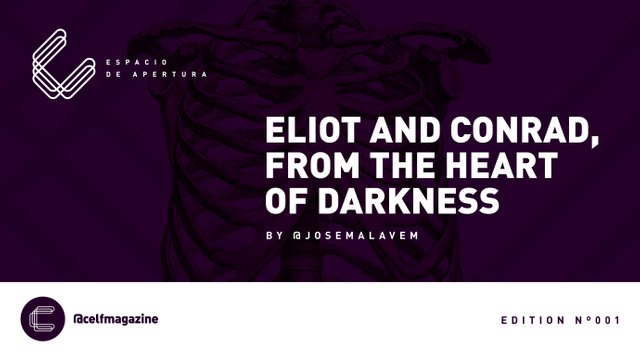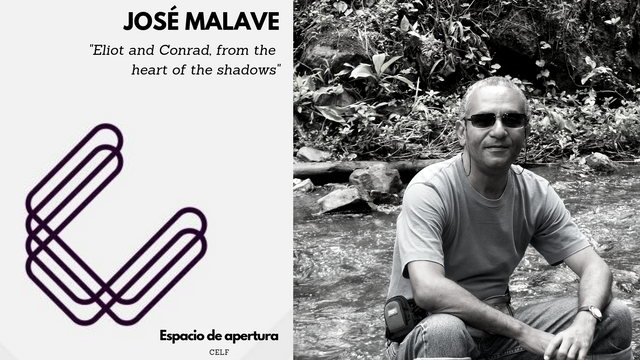
Eliot and Conrad, from the heart of the shadows
You can go to Conrad biography and download his novel, as well as a Eliot biography and his poem.

Entre tinieblas – Photography by Ane Lagerqvist Fuente
Eliot brings back and updates Conrad, as if this were the depositary of a primordial and unleashing image. The Hollow Men (1925) reveals, in its depth, the fascinating force of Heart of Darkness, written by Conrad approximately 26 years prior to Eliot's crisp poem. Conrad's presence is not strange when knowing how transtextuality centrally crosses the poetics of the author of The Wasteland.
Heart of Darkness (1) resonates like an echo inside the cavities of the eliotian text. The soul that breathes among the novelled thickness flows as murmur of steady river, through the intricacies of The Hollow Men.
Dour and laconic like the epitaph of a condemned man, an epigraph taken from the novel initiates the bewilderment, essence of the poem. Four words and a tone ("of scathing contempt", THD) mark the beginning and open up a reference that serves as a subtle contrast throughout the poem: "Mistah Kurtz - he dead". The voice of the black boy announcing the death of Mr Kurtz, a fictional shred lost in Conrad’s fictional jungle, concentrates and unfolds, hollow and impenetrable, the "glimpsed truth" (THD) of the poem.
We are not only facing a "paratext" (2); is not merely a decorative facade that announces the text; this inscription trembles like an enigmatic mark on the forehead, a signal that silently engraves the whole body of the poetic text. And so it uncovers his hidden intratextual aspect.
What does this threshold reveals to us? Where does this indifferent gibberish, this disaffected testimony, lead us? What glimpse of strangeness have we touched?

Joseph Conrad Fuente / T. S. Eliot Fuente
Like Eliot, we deepen into the novel. We listen to Kurtz's trembling voice: "I am lying here in the dark waiting for death” (THD). Death, the end of that "violent soul" (HM) that is Kurtz, also constitutes an approximation to that "inappreciable moment of time in which we step over the threshold of the invisible" (THD). Similar to the transition to "the other shore", is that "supreme moment of complete knowledge" (THD), the revelation of an abominable truth. Therefore, for Kurtz, death is expressed as an affirmation, a dreadful victory, a scream:
He cried in a whisper at some image, at some vision--he cried out twice, a cry that was no more than a breath:"¡The horror! ¡The horror!" (THD). (3)
This significance of death and of the descending path into the obscure truthness of the soul that preceded it, of which Kurtz is its desolating symbol, is only suggested in The Hollow Men, it stands out against the light of its counterpart (Therein lies the function of the mark which presides the beginning). It counterposes to that other sense of death that fills the poem's anatomy. Death as a sinking into indifference, paralysis, nullity, wasted life.
The hollow men speak to us from the annulment, from the fear of facing the darkness of a shattering truth that runs through them and "shuts off" the world. The fear for The Other fills the hollow men, paralyzes them in the very depths of horror.
Kurtz has glimpsed the horror, he has experienced it in "all the hearts that beat in the darkness" (THD). Experience of the abyss. He has taken his challenge all the way to annihilation, in order to achieve a higher level of lucidity in death. The hollow men, on the other hand, are an excrescence of horror, living in their disguises ("rat's coat", HM), blinded in their moribund inertia.

The emptiness of the soul - Albert Gyorgy (Geneva) Source
Which is why Kurtz, a living archetype in fiction, like the Old Guy Fawkes (4), living in history, is among "Those who have crossed / With direct eyes, to death's other kingdom" (HM). And in front of them arises disdain, sorrowful hollow gesture: "A penny for the Old Guy", says the other epigraph of The Hollow Men.
The hollow men inhabit the interregnum where "Falls the Shadow" (HM), that everyday place that is the kingdom of death, arid and motionless. Also here, death is the end of the world, only that it ends with a groan, not a cry.
(1) Quotations from The Heart of Darkness are taken from the 1980 Alianza Editorial spanish edition “El Corazón de las Tinieblas”, translated by Araceli García Ríos; the ones from The Hollow Men inside Poesía reunida 1909-1962 as “Los Hombres Huecos” by T. S. Eliot are taken from the 1979 Alianza Tres Spanish edition, translated by José María Valverde. Quotations are identified with the abbreviations THD and HM, respectively.
(2) In Gérard Genette’s theory of transtextuality, under the category of “paratext” are listed titles, subtitles, notes, epigraphs, etc., that enrich the text and constitute a first commentary.
(3) The film Apocalypse Now by Francis Ford Coppola is a freely adapted version of The Heart of Darkness . We'll remember that the main character, Colonel Kurtz, an American army officer who revolted against it, hiding in the Vietnam jungle during the war, is assassinated by another officer sent on a special mission. As he is dying, he also shouts this exclamation.
(4) A plotter against the English monarchy in the 17th century. After being betrayed he was condemned to the gallows.
By: @josemalavem
José Malavé Méndez (@josemalavem). Born in Cumaná, Venezuela. Bachelor's degree in Education, mention Spanish and Literature from the Universidad de Oriente (Venezuela) and a Master's degree in Venezuelan Literature. Professor attached to the Department of Philosophy and Literature of the School of Humanities and Education of the Universidad de Oriente. Coordinator of Casa Ramos Sucre (1983-1993). Author of poetry books such as "Breviario de sombras" and "Oculta y próxima". He has published poems, essays and articles in magazines, literary supplements and newspapers within the country. He has developed an extensive work as an organizer and cultural promoter both in literature and film.

A space for art, culture and the artistic world; to approach it from a reflective, informative and opinion point of view, not necessarily academic; thus proposing a contribution where the goal is to awaken and feed the reflection and learning of the readers.
Posted from my blog with SteemPress : http://celfmagazine.ml/2018/11/24/espacio-de-apertura-1-eliot-and-conrad-from-the-heart-of-darkness/
A magnificent critical text, very well documented and with the necessary references to give us enlightening interpretations.
Congratulations, @celfmagazine, for opening such an enriching space.
Downvoting a post can decrease pending rewards and make it less visible. Common reasons:
Submit
Hi @celfmagazine!
Your post was upvoted by @steem-ua, new Steem dApp, using UserAuthority for algorithmic post curation!
Your UA account score is currently 3.786 which ranks you at #4643 across all Steem accounts.
Your rank has improved 5 places in the last three days (old rank 4648).
In our last Algorithmic Curation Round, consisting of 249 contributions, your post is ranked at #179.
Evaluation of your UA score:
Feel free to join our @steem-ua Discord server
Downvoting a post can decrease pending rewards and make it less visible. Common reasons:
Submit
Thank you, friends of @celfmagazine, for this English version of my essay. I didn't know it had been published. Greetings.
Downvoting a post can decrease pending rewards and make it less visible. Common reasons:
Submit